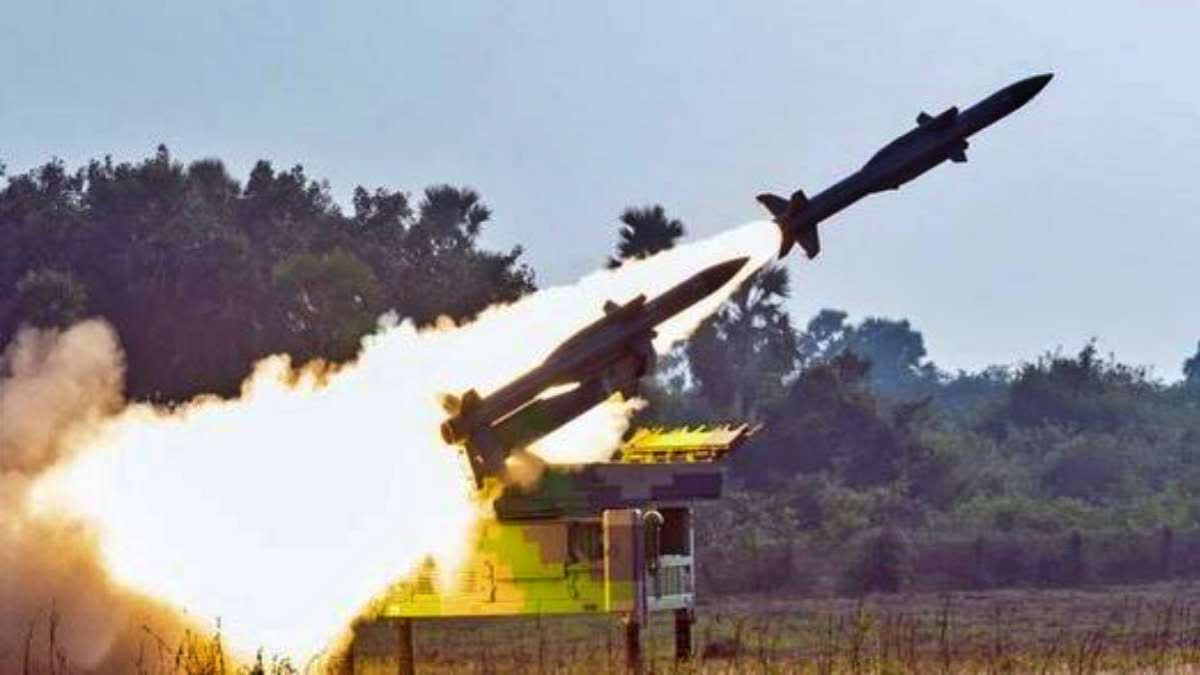New Delhi: After India struck a Rs 6,000-crore deal to export the indigenously-developed Akash air defence missile system to Armenia, Egypt has now expressed its interest in acquiring the medium-range surface-to-air missile (SAM).
The Akash SAM system was developed by India’s Defence Research and Development Organisation (DRDO) and is produced by Hyderabad-based Bharat Dynamics Ltd (BDL). The Akash missile system can target aircraft up to 45 km away. It has the capability to neutralise aerial targets like fighter jets, cruise missiles and air-to-surface missiles as well as ballistic missiles. It is in operational service with the Indian Army and the Indian Air Force.
The system is fully mobile and capable of protecting a moving convoy of vehicles. The launch platform has been integrated with both wheeled and tracked vehicles. While the Akash system has primarily been designed as an air defence SAM, it also has been tested in a missile defence role.
Expected to have starting costs below $500,000 or Rs 2 crore, each missile is poised to be notably more cost-effective compared to Western counterparts. Typically priced between $1.2-1.5 million (Rs 5-6 crore) per missile, this represents less than half the expense. Further cost reductions are foreseen as economies of scale come into play with increased production volumes.
News of the Rs 6,000-crore deal with Armenia comes after the Defence Ministry had mentioned in April this year about an undisclosed export order for the SAM system without naming the receiving nation. Deliveries of the missile system are expected to start from the second quarter of 2024.
Defence cooperation is a key pillar of India-Armenia bilateral relations. In recent years, New Delhi has engaged in significant military equipment sales to Yerevan. A notable instance occurred in March 2020 when Armenia, becoming the first international client, acquired the Indian Swathi radar system at a cost of $40 million. This system, a collaborative effort between the DRDO and Bharat Electronics Limited (BEL), represents the latest generation of phased array or electronically steered radars utilised by ground forces to detect and guide counter-battery fire against enemy ordnances.
Then again, in September 2022, a $245-million contract was signed for the Pinaka multi-barrel rocket launchers, anti-tank rockets, and various types of ammunition. India has key interests in boosting defence cooperation with Armenia.
“Over the last few years, India-Armenia relationship became very prominent because of a strategic angle,” Abhinav Pandya,founder, director and CEO of the Usanas Foundation think tank, told ETV Bharat. “Armenia was attacked by Azerbaijan and Azerbaijan is supported by Pakistan and Turkey. This is very crucial to us as Pakistan is India’s arch enemy. Azerbaijan and Turkey support Pakistan on the Kashmir issue. So, India needs to counter that trilateral axis of Pakistan, Azerbaijan and Turkey in the South Caucasus region. This is why India is supplying defence equipment to Armenia. Armenia supports India on the Kashmir issue.”
Secondly, Pandya said, India is very interested in defence cooperation with Armenia because of the various strategic connectivity projects like the International North-South Transport Corridor (INSTC). The INSTC is a 7,200-km-long multi-modal network of ship, rail, and road route for moving freight between India, Iran, Azerbaijan, Russia, Central Asia and Europe. The route primarily involves moving freight from India, Iran, Azerbaijan and Russia via ship, rail and road. Since the project is not making much progress, Armenia is being seen as a country that can provide a viable alternative corridor instead of through Azerbaijan.
“Now, if Pakistan and Turkey establish their stronghold in that region, it would be very difficult to protect such a strategic connectivity project like INSTC,” Pandya said. “Pakistan is an expert in creating insurgency. That’s why India needs to have a strong footprint in that area.” Pandya also said that if India’s missile system is successfully tested in Armenia, then Indian indigenously manufactured defence equipment will get an international market.
Egypt now becomes an example. According to the military.africa website, Egypt, one of India’s strategic partners in West Asia and North Africa, has expressed interest in acquiring the Akash SAM system. During Prime Minister Narendra Modi’s visit to Cairo in June this year, the India-Egypt relationship was elevated to that of a Strategic Partnership. Defence and security form a core area of this Strategic Partnership, the others being political, economic engagement and scientific and academic collaboration.
The bilateral defence ties received a further boost when Egyptian President Abdel Fattah El-Sisi visited New Delhi in January this year as chief guest of the Republic Day parade and held talks with Modi. The two leaders discussed ways to enhance their collaboration in the interaction between armed forces and the sale of Indian-made weapon systems.
“Apart from the Akash missile system, Egypt has also shown interest in other Indian-made defence products, such as the Akash NG (New Generation) air defence system, which has a longer range and higher accuracy than the Akash Mk1, and the Smart Anti-Airfield Weapon (SAAW), a precision-guided glide bomb developed by DRDO,” the military.africa report stated.
According to reports, apart from Armenia and Egypt, the Philippines, Belarus, Malaysia, Thailand, the United Arab Emirates (UAE), Vietnam and Brazil have also shown interest in purchasing the Akash missile system. This comes as a boost to Atmanirbhar Bharat in the fence sector.
Also read:



